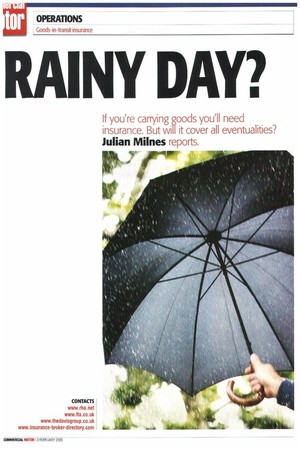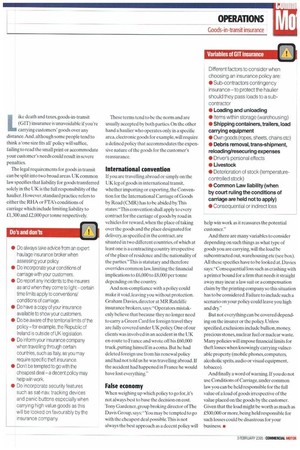RA NI' DAY?
Page 58

Page 59

If you've noticed an error in this article please click here to report it so we can fix it.
If you're carrying goods you'll need
insurance. But will it cover all eventualities?
Julian Nines reports. Like death and taxes, goods-in-transit (GIT) insurance is unavoidable if you're carrying customers' goods over any distance. And. although some people tend to think a'one size fits all' policy will suffice, failing to read the small print or accommodate your customer's needs could result in severe penalties.
The legal requirements for goods in transit can be split into two broad areas. UK common law specifies that liability for goods transferred solely in the UK is the full responsibility of the haulier. However, standard practice refers to either the RI-IA or FTA's conditions of carriage which include limiting liability to £1,300 and £2,000 per tonne respectively. These terms tend to be the norm and are usually accepted by both parties. On the other hand a haulier who operates only in a specific area, electronic goods for example,will require a defined policy that accommodates the expensive nature of the goods for the customer's reassurance.
International convention
II you are travelling abroad or simply on the UK leg of goods in international transit, whether importing or exporting, the Convention for the International Carriage of Goods by Road (CMR) has to be abided by.'This states: "This convention shall apply to every contract for the carriage of goods by road in vehicles for reward, when the place of taking over the goods and the place designated for delivery, as specified in the contract, are situated in two different countries, of which at least one is a contracting country irrespective of the place of residence and the nationality of the parties."This is statutary and therefore overrides common law, limiting the financial implications to £6,000 to £8,000 per tonne depending on the country And non-compliance with a policy could make it void, leaving you without protection. Graham Davies, director at MR Ratcliffe insurance brokers, says:"Operators mistakenly believe that because they no longer need to carry a Green Card for foreign travel they are fully covered under UK policy One of our clients was involved in an accident in the UK en-route to France and wrote off his £60,000 truck,putting himself in a coma. But he had deleted foreign use from his renewal policy and had not told us he was travelling abroad. If the accident had happened in France be would have lost everything."
False economy
When weighing up which policy to go for, it's not always best to base the decision on cost. Tony Gardener, group broking director of The Davis Group, says:"You may be tempted logo with the cheapest deal possible.This is not always the best approach as a decent policy will help win work as it reassures the potential customer."
And there are many variables to consider depending on such things as what type of goods you are carrying, will the load be subcontracted out,warehousing etc (see box). All these specifics have to be looked at. Davies says: "Consequential loss such as crashing with a printer bound for a firm that needs it straight away may incur a law suit or a compensation claim by the printing company so this situation has to be considered. Failure to include such a scenario on your policy could leave you high and dry."
But not everything can be covered depending on the insurer or the policy. Unless specified, exclusions include bullion, money, precious stones, nuclear fuel or nuclear waste. Many policies will impose financial limits for theft losses when knowingly carrying vulnerable property (mobile phones,computers, alcoholic sprits, audio or visual equipment, tobacco).
And finally a word of warning. If you do not use Conditions of Carriage, under common law you can be held responsible for the full value of a load of goods irrespective of the value placed on the goods by the customer. Given that the load might be worth as much as £500,000 or more, being held responsible for such losses could be disastrous for your business. •


































































































































































































